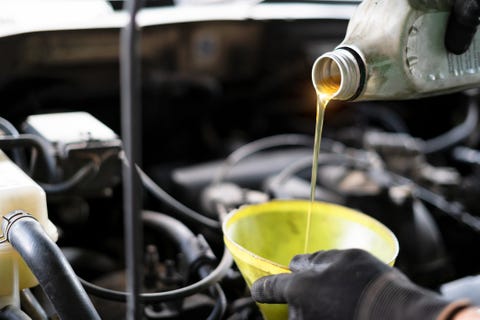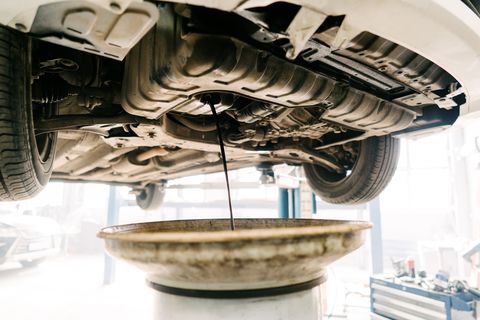Can Changing Your Oil Too Often Damage Gaskets
You bring your motorcar to the motorcar repair shop and they slap a sticker on the windshield: change your oil again in iii,000 miles or three months. You probably knew that the 3,000-mile interval was ridiculous, only what about that other borderline? What if yous don't drive much and permit your oil sit for six months? A year?
🔨 You love DIY projects. And then practise we. Allow'due south build something cool together.
I know a guy with a fleet of Ferraris—some of them vii-figure cars—and he goes only by mileage. "That oil was in the ground for 100 million years," he says. "What'due south six more months?" That's a good question, and one that I recently answered through semi-intentional negligence.
Hither's what happened: In 2008, I bought a Troy-Bilt lawnmower with a Honda engine. After a few years, I realized I hadn't inverse the oil. But, past then, electrical mowers were getting cheap, and I really wanted an electric mower. I figured I'd just permit the Troy-Bilt go until it blew upwards—which it refused to do. I kept mowing my lawn, flavour subsequently season, the niggling Honda purring away, until I eventually started feeling bad for the thing. I decided that if I pulled the trigger on an electric mower, I could at least give my Troy-Bilt to someone who would utilize it. I warmed it up, tilted it over, and drained the oil, saving a few ounces to transport to Blackstone Laboratories, an oil-testing company in Fort Wayne, Indiana.
I was particularly interested in the TBN (total base of operations number). Oils contain bases to prevent acidification, then the TBN shows how much additive is left to keep it healthy. A TBN of less than one is considered bad. My oil's TBN? 5. Hooray! The sample was also spot-on for average values of zinc and calcium, but a piddling loftier on sodium. Silicon was manner high, about four times higher than normal. Flashpoint—the temperature when the oil'south vapors ignite, which can signify a contaminant similar fuel in the oil—was a little low, at 360 degrees Fahrenheit.
Long story short: the oil was dirty, but leaving information technology in that location for 10 years didn't really injure anything. What does that mean? Blackstone wrote information technology out on my oil's report carte: "Universal averages bear witness typical clothing for similar Honda engines with about 65 hours on the oil. This oil was in use for ten years, and may fifty-fifty be the factory make full. If so, some of the excess metallic is from initial break-in and silicon could be sealer material from assembly. Silicon tin can also prove abrasive dirt contagion, which causes poor internal wear. There's likewise some fuel and moisture in the oil. The TBN is okay at v.0, so the oil really has additive left in reserve. Brand sure the air filter is in good status."
So, should y'all wait ten years between oil changes? No. Merely don't worry if you lot miss the date on the Jiffy Lube sticker.
Why Do Repair Shops Say I Should Change My Oil And then Dang Often?
Your average iii,000-mile quickie-lube sticker gives you lot a general suggestion of when to change your oil based on a really astringent maintenance schedule. Their chore is to sell oil changes, after all. The real authority yous should consult first—if you're erring on the side of circumspection and not in the market for a new lawnmower—is the owner's transmission for your vehicle. Different vehicles take different maintenance needs, particularly with recent advances in automotive technology that have pushed some newer cars' oil change intervals out to 7,500 or 10,000 miles, or one time every six to 12 months.
Why Are Oil Modify Recommendations Given in Mileage and in Time?
Oil degrades over time. The longer information technology sits, the less viscous it becomes and thus, the less effective it will exist at keeping various engine components properly lubricated. Constructed oil is designed to break downwardly more slowly over fourth dimension, which means you can probably stretch its oil changes out a little longer, only it notwithstanding breaks down similar any other oil. Oil that degrades besides much can cause engine sludge that can cake oil flow entirely.
How Often Should You Change Your Oil?
Even if you don't bulldoze very frequently and you're not hitting the recommended mileage interval, it's best to go your oil changed twice a year. Your oil may exist fine, just it's the wet in your engine that's the real enemy. If you don't run your car for very long very often, the engine won't get hot plenty to burn off this wet, and your oil won't exist as effective at lubricating your engine, eventually leading to shorter engine life.
What Is a "Normal" Vs. "Severe" Maintenance Schedule for Oil Changes?
Recall how nosotros keep calling the quick lube's usual suggestion "severe?" Owners' manuals oft listing both a "normal" and a "severe" maintenance schedule, with the latter being for harder driving, farthermost weather, and other cases where at that place's extra stress per mile on the engine, such equally hauling heavy loads, towing, and track day use.
This is bad news for your grandparents' couple-blocks-to-church use case: never getting the engine warm enough to burn down off whatever condensation inside is likewise considered "astringent" use. It typically takes virtually 10 miles to burn down off that moisture, so if trips over 10 miles are rare-to-never, follow the "severe" schedule until you can get an expert analysis done.
How Can I Check My Oil?
Few things beat simply pulling the dipstick out of the engine for a visual check. Even new cars can consume a niggling oil and may demand topping off, so this is a good idea to do well-nigh once a month anyway. Taking a look at the dipstick can likewise give you an idea of when you should change your oil based on your driving habits.
Look for mutual warning signs of engine impairment while you're peeking at your dipstick. If your oil looks lighter or cloudier than usual—frothy like latté foam in farthermost cases—y'all may accept coolant leaking into the engine, perhaps from a broken head gasket. Watch out for whatever glittery chunks of metal, besides. That unremarkably signifies internal engine harm, potentially from metallic parts not getting lubricated well enough. Either manner, if your oil looks a trivial too glittery for condolement or smells also much similar another fluid (such as coolant), that's a good time to get an oil analysis washed to determine how that may have happened.
How To Become Your Oil Tested
An oil assay volition tell yous how long your motorcar tin can really become between oil changes. They're cheap, too—Blackstone'due south standard analysis is merely $thirty, and tin tell you if you lot're changing your oil likewise often or not often enough. Knowing to skip even one unnecessary trip to the shop makes information technology worthwhile.
➡️ Step 1: Set up for a full oil change
Don't change your oil just yet! You lot need to pull your sample from your muddy oil, after all. Await to stop your oil change until after you've pulled a sample.
➡️ Footstep ii: Warm upwardly your engine
Warming upward your engine's oil helps circulate your oil i last time, heating the oil so it can flow more than freely out of your oil drain plug.
➡️ Step 3: Bleed your oil and have your sample
You lot could pull only enough for a sample, but the results might overrepresent the dirt lurking effectually the drain. Instead, be sure to have your oil sample sample mid-menstruation to become the best representation of what's in your oil pan. Take a clean container set up. I used an empty h2o bottle—dry, of grade.
➡️ Step 4: Make sure there are no leaks
In Blackstone'southward case, y'all wrap the sample jar in absorbent material, nil that in a plastic pocketbook, and then put that in a larger plastic container, which y'all besides seal. That one has a prepaid USPS sticker on it, then off it goes—maybe. Oil is non a chancy material, but some Mail service Part locations might give you guff most sending information technology. Refer them to USPS Publication 52, "Chancy, restricted and perishable post." Alternately, just put your sample in a box.
🎥 Now Scout This:
This content is created and maintained by a third political party, and imported onto this page to assistance users provide their email addresses. You may be able to find more data about this and similar content at piano.io
Source: https://www.popularmechanics.com/cars/car-technology/a24676402/old-motor-oil/
Posted by: chavezhond1975.blogspot.com




0 Response to "Can Changing Your Oil Too Often Damage Gaskets"
Post a Comment